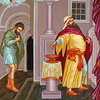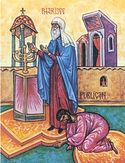

| Previous day | Next day |
| Old Style
February 12
|
Sunday |
New Style
February 25
|
| Sunday of the Publican and the Pharisee. Tone 5. | No fast.
|
![]() Appearance of the Iveron Icon of the Most Holy Theotokos (Mt. Athos) (9th c.).
Appearance of the Iveron Icon of the Most Holy Theotokos (Mt. Athos) (9th c.). ![]() St. Meletius, archbishop of Antioch (381).
St. Meletius, archbishop of Antioch (381). ![]() St. Alexis, metropolitan of Moscow (1378). St. Meletius, archbishop of Kharkov (1840).
St. Alexis, metropolitan of Moscow (1378). St. Meletius, archbishop of Kharkov (1840).
St. Mary, nun (who was called Marinus), and her father, St. Eugene, monk, of Alexandria (6th c.) St. Anthony II, patriarch of Constantinople (895). St. Meletius of Lardos, founder of Ypseni Monastery (late 19th c.). St. Bassian, founder of Ryabovsk Monastery (Uglich) (1509). Hieromartyr Urbanus, pope of Rome (223-230).
New Hiero-confessor Basil (Bogdashevsky), archbishop of Kanev (1933).
St. Ethilwald of Lindisfarne (740). St. Prochorus of Georgia, builder of Holy Cross Monastery near Jerusalem (1066). New Monk-martyrs Luke (Mukhaidze) (1277) and Nicholas (Dvali) (1314), of Jerusalem, and the holy fathers of the Georgian monasteries in Jerusalem. New Martyr Christos the Gardener, of Albania, at Constantinople (1748).
Repose of the cave-dweller Anastasia (Logacheva) of Ardatov (1875).
Thoughts for Each Day of the Year
According to the Daily Church Readings from the Word of God
By St. Theophan the Recluse

Sunday of the Publican and the Pharisee (33rd). [II Tim. 3:10–15; Luke 18:10–14]
Yesterday the Gospel reading taught us persistence in prayer, and now it teaches humility, or a feeling of having no right to be heard. Do not assume that you have the right to be heard, but approach prayer as one unworthy of any attention, allowing yourself only the boldness needed to open your mouth and raise up your prayer to God, knowing the Lord’s boundless condescension toward us poor ones. Do not even allow the thought to come to your mind, “I did such and such—so give me such and such.” Consider whatever you might have done as your obligation. If you had not done it you would have been subject to punishment, and what you did is actually nothing deserving reward; you did not do anything special. That Pharisee enumerated his rights to be heard, and left the church with nothing. The harm is not that he had actually done as he said, for indeed he should have done it. The harm is that he presented it as something special; whereas, having done it he should have thought no more of it. Deliver us, O Lord, from this sin of the Pharisee! One rarely speaks as the Pharisee in words, but in the feelings of the heart, one is rarely unlike him. For why is it that people pray badly? It is because they feel as though they are just fine in the sight of God, even without praying.
Articles
 Iveron Icon of the Mother of God |
 Venerable Mary (who was called Marinus), and her father at AlexandriaSaint Mary and her father Eugene lived at the beginning of the sixth century in Bithynia (northwestern Asia Minor). |
 St. Anthony the Patriarch of ConstantinopleSaint Anthony, Patriarch of Constantinople, was a native of Asia, but lived in Constantinople from his youth. |
 St. Bassian of UglichSaint Bassian came to the Protection monastery when he was thirty-three years of age, and was soon tonsured by Saint Paisius. |
 The Sunday of the Publican and the Pharisee |












